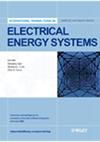F. Rameshkhah, M. Abedi, S. Hosseinian
{"title":"电力系统电压控制区分组中有约束数据聚类的洗阵蛙跳算法与粒子群算法的比较","authors":"F. Rameshkhah, M. Abedi, S. Hosseinian","doi":"10.1002/ETEP.532","DOIUrl":null,"url":null,"abstract":"Voltage Control Areas (VCAs) play an important role in voltage stability assessment and control. Since it is impossible to detect VCAs in real time during appearance of emergency cases for large-scale power systems, it is a reasonable solution to train and employ an artificial intelligent system (AIS), for on-line predicting of VCAs. However, at different emergency and alert cases, there are various VCAs for power system. Clustering the data of Participation Factors (PFs) of all studied cases into a finite number of groups would lead to a more accurate ANN-based online VCA identifier. Each cluster has a representative center that is the critical VCA corresponding to all contingencies and load stresses which would lead to the same cases as the members of that cluster. In this paper a novel data clustering method based on shuffled frog leaping algorithm (SFLA) is presented for this purpose. In the first part of present study the general application of SFLA in data clustering is compared with PSO as the most popular Memetic Algorithm (MA), to demonstrate the validity of proposed clustering method. Consequently, as the clustering of VCAs is a problem with linear equality constraint, the compatibility of SFLA for solving under constraint clustering problems and its priority to PSO from this point of view, are shown in this study. Numerical results are presented at the first part for three standard test data sets and at the second part for IEEE 118-bus test system. Copyright © 2010 John Wiley & Sons, Ltd.","PeriodicalId":50474,"journal":{"name":"European Transactions on Electrical Power","volume":"21 1","pages":"1763-1782"},"PeriodicalIF":0.0000,"publicationDate":"2011-07-01","publicationTypes":"Journal Article","fieldsOfStudy":null,"isOpenAccess":false,"openAccessPdf":"https://sci-hub-pdf.com/10.1002/ETEP.532","citationCount":"6","resultStr":"{\"title\":\"Comparison of shuffled frog leaping algorithm and PSO in data clustering with constraint for grouping voltage control areas in power systems\",\"authors\":\"F. Rameshkhah, M. Abedi, S. Hosseinian\",\"doi\":\"10.1002/ETEP.532\",\"DOIUrl\":null,\"url\":null,\"abstract\":\"Voltage Control Areas (VCAs) play an important role in voltage stability assessment and control. Since it is impossible to detect VCAs in real time during appearance of emergency cases for large-scale power systems, it is a reasonable solution to train and employ an artificial intelligent system (AIS), for on-line predicting of VCAs. However, at different emergency and alert cases, there are various VCAs for power system. Clustering the data of Participation Factors (PFs) of all studied cases into a finite number of groups would lead to a more accurate ANN-based online VCA identifier. Each cluster has a representative center that is the critical VCA corresponding to all contingencies and load stresses which would lead to the same cases as the members of that cluster. In this paper a novel data clustering method based on shuffled frog leaping algorithm (SFLA) is presented for this purpose. In the first part of present study the general application of SFLA in data clustering is compared with PSO as the most popular Memetic Algorithm (MA), to demonstrate the validity of proposed clustering method. Consequently, as the clustering of VCAs is a problem with linear equality constraint, the compatibility of SFLA for solving under constraint clustering problems and its priority to PSO from this point of view, are shown in this study. Numerical results are presented at the first part for three standard test data sets and at the second part for IEEE 118-bus test system. Copyright © 2010 John Wiley & Sons, Ltd.\",\"PeriodicalId\":50474,\"journal\":{\"name\":\"European Transactions on Electrical Power\",\"volume\":\"21 1\",\"pages\":\"1763-1782\"},\"PeriodicalIF\":0.0000,\"publicationDate\":\"2011-07-01\",\"publicationTypes\":\"Journal Article\",\"fieldsOfStudy\":null,\"isOpenAccess\":false,\"openAccessPdf\":\"https://sci-hub-pdf.com/10.1002/ETEP.532\",\"citationCount\":\"6\",\"resultStr\":null,\"platform\":\"Semanticscholar\",\"paperid\":null,\"PeriodicalName\":\"European Transactions on Electrical Power\",\"FirstCategoryId\":\"1085\",\"ListUrlMain\":\"https://doi.org/10.1002/ETEP.532\",\"RegionNum\":0,\"RegionCategory\":null,\"ArticlePicture\":[],\"TitleCN\":null,\"AbstractTextCN\":null,\"PMCID\":null,\"EPubDate\":\"\",\"PubModel\":\"\",\"JCR\":\"\",\"JCRName\":\"\",\"Score\":null,\"Total\":0}","platform":"Semanticscholar","paperid":null,"PeriodicalName":"European Transactions on Electrical Power","FirstCategoryId":"1085","ListUrlMain":"https://doi.org/10.1002/ETEP.532","RegionNum":0,"RegionCategory":null,"ArticlePicture":[],"TitleCN":null,"AbstractTextCN":null,"PMCID":null,"EPubDate":"","PubModel":"","JCR":"","JCRName":"","Score":null,"Total":0}
引用次数: 6
Comparison of shuffled frog leaping algorithm and PSO in data clustering with constraint for grouping voltage control areas in power systems
Voltage Control Areas (VCAs) play an important role in voltage stability assessment and control. Since it is impossible to detect VCAs in real time during appearance of emergency cases for large-scale power systems, it is a reasonable solution to train and employ an artificial intelligent system (AIS), for on-line predicting of VCAs. However, at different emergency and alert cases, there are various VCAs for power system. Clustering the data of Participation Factors (PFs) of all studied cases into a finite number of groups would lead to a more accurate ANN-based online VCA identifier. Each cluster has a representative center that is the critical VCA corresponding to all contingencies and load stresses which would lead to the same cases as the members of that cluster. In this paper a novel data clustering method based on shuffled frog leaping algorithm (SFLA) is presented for this purpose. In the first part of present study the general application of SFLA in data clustering is compared with PSO as the most popular Memetic Algorithm (MA), to demonstrate the validity of proposed clustering method. Consequently, as the clustering of VCAs is a problem with linear equality constraint, the compatibility of SFLA for solving under constraint clustering problems and its priority to PSO from this point of view, are shown in this study. Numerical results are presented at the first part for three standard test data sets and at the second part for IEEE 118-bus test system. Copyright © 2010 John Wiley & Sons, Ltd.

 求助内容:
求助内容: 应助结果提醒方式:
应助结果提醒方式:


